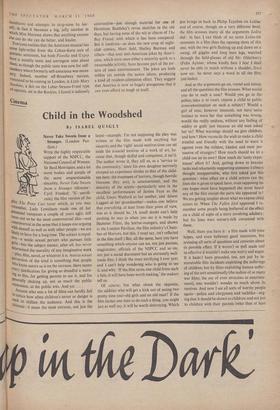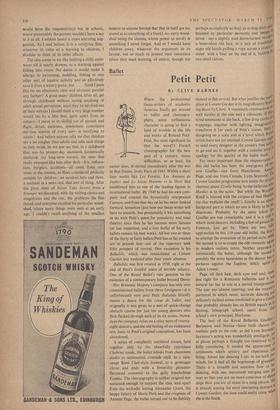Cinem a
Child in the Woodshed
By ISABEL QUIGLY
Never Take Sweets from a Stranger. (London Pav- ilion.) WITH the highly respectable support of the NSPCC, the National Council of Women. Sir Basil Henriques, and a lot more bodies and people of the same unquestionable sincerity, Never Take Sweets from a Stranger (director: Cyril Frankel; 'X' certifi- cate); the film version of the Play The Pony Cart (over which, as you may remember, Lady Lewisham made one of her Perennial rumpuses a couple of years agp), still turns out to be the most controversial film—and controversial in the sense that it keeps one arguing With oneself as well as with other people—we are rely to have for a long time. The subject is repul- sive—a senile sexual pervert who pursues little girls—but the subject matter, after all, has never determined the morality of any imaginative work film, novel, or whatever it is. And as sexual Perversion of the kind is something that people Who know now assure us is on the increase, there seems every justification for giving as dreadful a warn- ing as this, for getting parents to see it, and for generally shaking up, not so much the public conscience, as the public wits. And yet . . . Anyone who sees a lot of films can hardly fail to notice how often children's terror or danger is used to titillate the audience. And this is the —.Le—I mean the most extreme, not just the
latest—example. I'm not supposing the play was written or the film made with anything but sincerity and the 'right' social motives (one can set aside the a-social motives of a work of art, be- cause that, though skilful and competent, it isn't). The author wrote it, they tell us, as a 'service to the community,' since his own daughter narrowly escaped an experience similar to that of the child- ren here; the treatment of horrors, though horrific (because they are), is unsensational, and the sincerity of the actors—particularly seen in the excellent performances of Janina Faye as the child, Gwen Watford as her mother, and Alison Leggatt as her grandmother—makes one believe that everything, at least from their point of view, was as it should be. (A small doubt can't help pushing its way in when you see it is made by Hammer Films, the horror-mongers, and shown at the London Pavilion, the film industry's Cham- ber of Horrors, but this, I must say, isn't reflected in the film itself.) But, all the same, here you have something which anyone can see, not just parents, magistrates, officials of the NSPCC and so on; not just a social document but an extremely well- made film, I think the most terrifying I ever saw; and I can't help wondering who is going to see it, and why. 'If the film saves one child from such a fate, it will have been worth making,' the makers tell us.
Of course; but what about the opposite, the oddities who will get a kick out of seeing two pretty nine-year-old girls and an old man? If the film incites one man to do such a thing, you might just as well say, it will be worth destroying. Which just brings us back to Philip Toynbee on Lolita; and of course, though on a very different level, the film arouses many of the arguments Lolita did : in fact 1 can think of no more Lolita-ish moments in a 'film than the opening shots of this one, with the two girls flashing up and down on a swing, all giggles and long bare legs, watched through the field-glasses of old Mr. Olderberry (Felix Aylmer, whose kindly face I fear I shall never be able to watch without a shudder, from now on : he never says a word in all the film, just looks).
And so the arguments go on, round and round. and all the questions the film arouses. What would you do in such a case? Would you go to the police, take it to court, expose a child to public cross-examination on such a subject? Would a girl of nine, however innocent, not have some instinct to warn her that something was wrong; would she really undress, without any feeling of oddity or guilt just because an old man asked her to? What warnings should we give children, and how? How reconcile the wish to make a child trustful and friendly with the need to warn it against even the mildest, kindest and most per- suasive of strangers? How much should we let a child out on its own? How much do 'nasty exper- iences' affect it? And, getting down to brassier tacks and reluctantly supporting someone I always thought insupportable, who first asked just this question : what effect on a child actress can the lines she is given to speak have, even supposing (as one hopes must have happened) she never heard any of the film except the parts she appeared in? We are getting tougher about what we expose child actors to. When The Fallen Idol appeared I re- member some people being bothered at the effect on a child of eight of a story involving adultery; but his lines were nursery-talk compared with these.
Well, there you have it : a film made with (one hopes, and even believes) good intentions, but arousing all sorts of questions and anxieties about its possible effect. If it weren't so well made and so effective it wouldn't make one worry and argue. If it hadn't been preceded, too, not just by in- numerable film incidents exploiting the sufferings of children, but by films exploiting human suffer- ing of the sort sensationally (the sadism of so many war films, the use of even atrocities as entertain- ment), one wouldn't wonder so much about its motives. And now I see all sorts of worthy people again—police and clergymen and suchlike—urg- ing that it should be shown to children; and not just ' to children with their parents (who then at least
would have the responsibility) but in schools, where presumably the parents wouldn't have a say in it at all. I seldom heard a more alarming sug- gestion. As I said before, it is a terrifying film: whatever its value as a warning to children, I shudder to think of its other effects.
The idea seems to me like holding a child under water till it nearly drowns, as a warning against falling into rivers. No doubt it would make it allergic to swimming, paddling, fishing or any other sort of aquatic activity and so effectively save it from a watery grave; but . . . Need I push this (to me absolutely clear and obvious) parallel any fartier? A great many children, after all, get through childhood without seeing anything of adult sexual perversion; need they be terrified out of their wits (as I should think a very large number would be) by a film that, quite apart from its subject—I mean in its skilful use of pursuit and flight, dread, darkness, spookiness, cumulative nervous tension of every sort—is terrifying to adults? And before anyone tells me that children are a lot tougher than adults and take such things in their stride, let me just say that, in a childhood that was by present-day standards fantastically sheltered, my long-term terrors, the ones that really swooped like bats after dark—fire, suffoca- tion, burglars, accidents—all came from rare visits to the cinema, to films considered perfectly suitable for children : an incident here and there, a moment in a news reel, that sort of thing. After the press show of Never Take Sweets from a Stranger we discussed, with the visiting clerics and magistrates and the rest, the problems the film raised, and everyone recalled his particular wood- shed, where nasty things were seen at an early age; I couldn't recall anything of the smallest interest to anyone (except that that in itself got me stared at as something of a freak), my early wood- shed being the cinema, whose power to terrify is something I never forget. And so 1 would keep children away, whatever the arguments in its favour, not so much to protect their innocence (since they need warning, of course, though. not perhaps as explicitly as this), as to stop them Del haunted by particular moments and images vi terror : say a slightly mad down-turned moulhir a benevolent old face, or a pair of tremblingl eager old hands pulling a rope across a stretch ° water, with a boat on the end of it, holding two small victims.











































 Previous page
Previous page